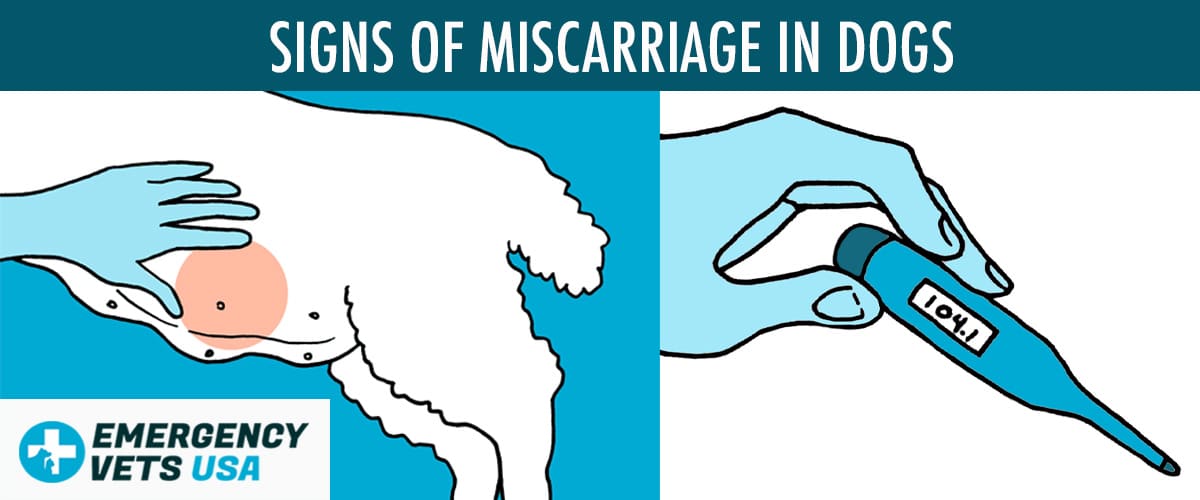Signs Of Miscarriage In Dogs
If you have a pregnant dog in your home, it is important to be aware of any potential complications that can occur throughout their pregnancy. A canine miscarriage can be a serious health threat to dogs, especially if the puppies are not birthed.
Our dogs can’t tell us if something feels off, so it’s up to us to keep an eye out for any sign of pregnancy related complications.
In this article we will discuss the details of a miscarriage in dogs, as well as helping you better understand what symptoms these pups may experience.

Can My Pregnant Dog Have A Miscarriage?
Unfortunately for our beloved pups, they can experience a miscarriage at any point throughout their pregnancy. A canine miscarriage refers to the death of the developing puppies in the uterus, often causing the puppy to either be absorbed by the body, birthed early, or even birthed stillborn alongside their other littermates.
A dog can have a miscarriage at any point throughout their pregnancy, with some occurring before the 45 day mark and others after. The main difference is how the body chooses to respond, as dogs that miscarry later in pregnancy are typically more at risk of serious health complications.
A normal dog pregnancy lasts around 63 days.
Miscarriages in dogs can occur due to a variety of reasons, but we will discuss these potential causes in more detail below.
What Causes A Spontaneous Abortion or Reabsorption In Dogs?
Just like a miscarriage that occurs in humans, we don’t always know the exact cause of their pregnancy loss. Dogs can have a spontaneous abortion due to a number of reasons, ranging from viral infections to improper nutrition.
To help you better understand your pregnant dog’s miscarriage, let’s break down the potential causes below.
Bacterial Or Viral Infections
In most female dogs that have a miscarriage, some form of infection is often to blame. Different types of bacteria or viruses can infect the pregnant mother, causing a fetal death or miscarriage at any point throughout their gestation.
One of the most common bacterial infections seen in dogs that miscarry is Brucella canis, which is a common sexually transmitted disease in dogs. It is spread from dog to dog through infected bodily fluids, so this often occurs during the process of breeding with an infected male.
In most dogs with Brucella canis, the miscarriage occurs late in pregnancy, often times giving birth to stillborn babies. In addition to causing miscarriage in dogs, it can also lead to uterine infection and infertility. Due to the risk of Brucella canis, most breeders will only breed their dogs with those that test negative for the bacteria.
In addition to Brucella canis, there are other bacterial infections that can lead to miscarriage in dogs. These include Pasteurella, E.coli, and Pseudomonas. Common viral and parasitic infections that cause canine miscarriages include Toxoplasma and Herpesvirus.
Hormonal Imbalances
A dog requires a specific hormonal balance to maintain a healthy pregnancy. If there is a sudden shift or decline in these hormones for any reason, this can easily lead to a sudden miscarriage in dogs.
For example, progesterone is the main hormone that is responsible for maintaining pregnancy in our canine friends. If their progesterone levels suddenly drop at any point throughout their pregnancy, this can cause the dog to miscarry.
Nutritional deficiencies
If a dog is deficient in the nutrients needed to grow healthy puppies, this can lead to a miscarriage in dogs. It takes a massive amount of energy and nutrients to create a life, especially when growing multiple pups in the uterus.
If a dog is severely nutrient deficient, they automatically have a much higher risk of losing their puppies. This is also the case for malnourished dogs, or those that are severely underweight.
Poor Health
Poor health in general can lead to a miscarriage in some dogs. Though this description is a blanket term used to describe an array of health complications, we are referring to any underlying condition that is impacting a dog’s overall health. This can include malnourishment, underlying infections, exposure to contagious illness, endocrine disorders, and congenital issues.
If your dog is struggling with an underlying health threat that is impacting their day to day lives, it could increase their risk of miscarriage.
Fetal Defects and Abnormalities
Sometimes a dog’s body knows when something is not quite right. If your pregnant dog has puppies in the uterus that are not developing properly, the body may respond to this by causing a spontaneous abortion. This could cause the dog to miscarry one or all puppies, but it will vary from case to case.
What Are the Signs Of A Dog Miscarriage?

Now that you are aware of the most common reasons why pregnant dogs suddenly miscarry, it’s time to discuss the many potential signs of a miscarriage in dogs. The loss of a pregnancy can lead to serious health complication in our furry friends, so it’s always important to be on the lookout for these signs if you have an intact or pregnant female dog in your home.
We should also mention that while late term miscarriages in dogs are often accompanied by symptoms, this is not always the case for miscarriages before 45 days along. Many dogs that miscarry early on in pregnancy will never display obvious signs of a miscarriage, with most pet owners only being aware of the pregnancy if they were diagnosed on ultrasound already.
Some of the most common symptoms of a late term miscarriage in dogs include:
- Vaginal discharge ranging in color from brown, green, dark green, or even black
- Stomach pain
- Lethargy
- Fever
- Anorexia
- Contractions occurring before their due date
- Early delivery of dead puppies
- Foul smelling discharge from the vulva
- Stumbling upon your dog eating unknown tissue
- Excessive bleeding from the vulva
If you notice any of the above symptoms in your dog, we always suggest seeking immediate veterinary advice. The above symptoms can be a sign of infection or retained puppies in your dog, and this can be life-threatening if it is left untreated.
The above symptoms can also be a sign of pyometra if your dog is not actually pregnant, but this still requires immediate veterinary treatment.
If My Dog Is Having A Miscarriage, Should I Take Them To The Vet?
If your dog is having noticeable symptoms of a miscarriage, we always suggest having them seen by your vet for good measure. This can allow your vet to address any brewing bacterial infection if it is present, as well as confirming whether or not the puppies are still viable.
If the puppies have indeed passed and their pregnancy cannot be saved, you will at least want to make sure that your dog is not at risk of any life threatening complications such as a retained puppy or pyometra.
In addition to offering your dog medical care, you may also want to get to the bottom of why your dog could have miscarried.
For example, many vets will suggest testing for the presence of any contagious bacteria or virus that could have caused their miscarriage, or even hormone testing that can measure their progesterone levels. This may not make a difference for your pup in their current pregnancy, but it can certainly make a difference if you plan to breed them in the future.
Can A Canine Miscarriage Be Fatal?
While the miscarriage itself may not be fatal, the complications that develop after certainly can be in some dogs. A dog that has a late term miscarriage is at risk of retaining their dead puppies, which means the puppies remain in the uterus even after death.
If this occurs, a dog can develop a life threatening uterine infection, and this requires immediate and aggressive treatment.
Thankfully for pet owners, most dogs will display signs of a brewing uterine infection. These dogs may experience lethargy, anorexia, abdominal pain, vomiting, fever, and vaginal discharge. If you notice any of these symptoms in your dog, we suggest seeking immediate veterinary care.
If My Dog Has A Miscarriage, Can They Get Pregnant In The Future?
Just because your dog has a miscarriage does not mean that they cannot get pregnant in the future. We do always suggest at least having them screened for any bacterial or viral infections that could have led to their pregnancy loss, as this will only happen again if it is not resolved.
If you do want to breed your dog that had a miscarriage in the past, we recommend having your pup screened by a vet before you move forward with breeding.
Your vet can then screen them for any underlying conditions that can impact their pregnancy, as well as offering you guidance on how to maintain your dog’s health throughout their gestation.
Final Thoughts
As you can see, our canine friends are not immune to pregnancy related complications and loss. By having your dog screened for infection and underlying health threats before breeding, you can potentially prevent miscarriage in the future.
Continue Reading…
- Signs Of A Dead Puppy Inside Of Mother’s Womb
- What Do Dog Contractions Look Like
- Dog Pregnancy Symptoms Week By Week
- Calculating Your Dog’s Due Date
Resources:

My name is Amber. I am a dedicated animal lover that turned my passion into my career. I am a Licensed Vet Tech with 12 years of experience in veterinary medicine, but I recently took my career online to help spread accurate information on animal care. With how vast the online world is, I have a strong desire to ensure that the reader always walks away with helpful pet advice. With the experience I’ve gained from my time in this field, I have been able to travel the world, offering my services to as many animal rescues as I can find. If I am not at my laptop, or back home visiting family, you can find me somewhere in the world, cuddling every furry friend that I can find! More About Us
